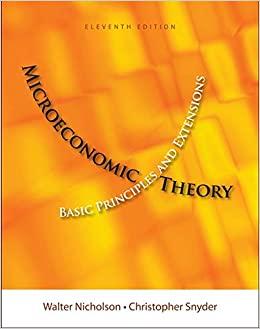10.9 Generalizing the CES cost function The CES production function can be generalized to permit weighting of...
Question:
10.9 Generalizing the CES cost function The CES production function can be generalized to permit weighting of the inputs. In the two-input case, this function is q ¼ fðk, lÞ ¼ ½ðakÞ
q þ ðblÞ
q
'
g=q
:
a. What is the total-cost function for a firm with this production function? Hint: You can, of course, work this out from scratch; easier perhaps is to use the results from Example 10.2 and reason that the price for a unit of capital input in this production function is v/a and for a unit of labor input is w/b.
b. If g ¼ 1 and a þ b ¼ 1, it can be shown that this production function converges to the Cobb–Douglas form q ¼ ka l
b as r fi 0. What is the total cost function for this particular version of the CES function?
c. The relative labor cost share for a two-input production function is given by wl/vk. Show that this share is constant for the Cobb–Douglas function in part (b). How is the relative labor share affected by the parameters a and b?
d. Calculate the relative labor cost share for the general CES function introduced above. How is that share affected by changes in w/v? How is the direction of this effect determined by the elasticity of substitution, s? How is it affected by the sizes of the parameters a and b?
Step by Step Answer:

Microeconomic Theory Basic Principles And Extension
ISBN: 9781111525538
11th Edition
Authors: Walter Nicholson, Christopher M. Snyder






